2023-2024 Annual Report
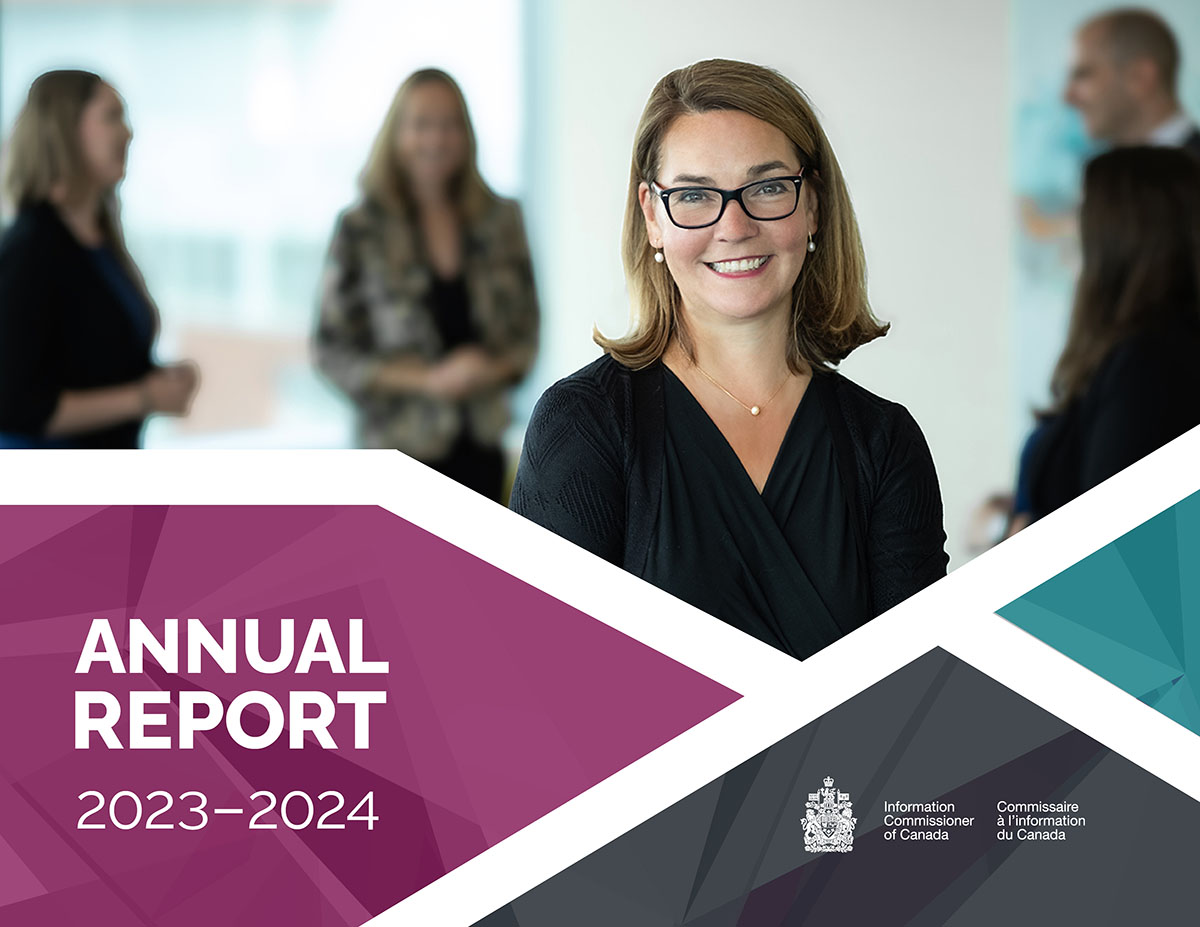
Table of contents
- Message from the Commissioner
- 2023–2024: Year in review
- Driving efficiency: A year of progress
- Operational enhancements in 2023–2024
- What happens when you submit a complaint?
- Orders: One possible outcome for complaints
- Observations on the access to information system
- About the Office of the Information Commissioner
- Annex — Annual report of the Ad Hoc Information Commissioner
Message from the Commissioner
It is with mixed emotions that I submit this report on the activities of the Office of the Information Commissioner between April 2023 and March 2024.
On the one hand, I am proud of our efforts to improve and refine our processes and tools, while continuing to uphold the right of access to information. On the other hand, after investigating more than 30,000 complaints, I am reminded every day of the ways in which the Act and the system it supports continue to fail Canadians. July of 2023 saw the 40th anniversary of the Access to Information Act come and go with little indication that amendments to this antiquated law are on the horizon. Through its response to the Standing Committee on Access to Information, Privacy and Ethics’ report on the state of Canada’s access to information system, the government has made it abundantly clear that Canadians will have to wait until at least 2025, when yet another review is to be launched, for any real change.
Over the past year, I have observed that government transparency has increasingly become a topic of greater interest to Canadians than it had been at any other time in my mandate. I have watched journalists explore freedom-of-information challenges across a number of jurisdictions, and parliamentary committees seek to shed light on issues of government secrecy and failures in record-keeping. Canadians are becoming increasingly aware of how these issues, which are at the heart of democracy, are affecting them in very real ways.
I welcome this increased attention, since it adds impetus to efforts to improve performance across the access system through leadership, culture change and technological innovation—a focus of mine whenever I meet leaders of government institutions. It has also provided me with more opportunities to speak to the media, work with my provincial and territorial counterparts and appear before parliamentary committees to highlight major issues that imperil the right of access. These include a persistent culture of secrecy within some institutions and ongoing delays in responding to access requests, with the net result that institutions respond to only one third of access requests within statutory timeframes.
In spite of such challenges, and even though we are constantly being asked to do more with less, I continue to ensure my office operates as effectively as possible within a system that is under pressure like never before. Enhancing efficiency has been a priority for me since my first day on the job, and I am proud of the results my team and I have achieved in the past year. Not only did we resolve nearly 25% more complaints than we registered, but we also made significant progress in reducing our inventory.
Unfortunately, my inability to secure temporary funding makes it nearly impossible to completely eliminate this inventory before my term ends in 2025. As we begin a new fiscal year, I find myself dealing with an unanticipated structural deficit. This is the result of covering the cost of unfunded salary increases under new collective agreements negotiated by the Treasury Board Secretariat for investigators and legal counsel who have joined my organization. These members of my team joined my office after I was granted order-making power, with all the added responsibility this entails, in order to support me in discharging my new obligations.
This unanticipated expense represents a 3% budget reduction, or about $465,000 in 2024-2025 and $425,000 in subsequent years, which is a significant strain on a small organization like mine. Every member of my team plays a vital role, and losing even a few can deeply impact my office’s ability to fulfill my mandate. This is one more reason why I continue to advocate for an independent funding model for my office, as recommended by the Standing Committee.
As I embark on the home stretch of my mandate as Information Commissioner of Canada, I remain committed to advocating for an overhaul of the system. I will also continue to lay the groundwork to ensure that my office is able to play an effective role in championing the legislative changes that will be required if Canada is to benefit from an access system that meets the needs of the 21st century.

Caroline Maynard
Information Commissioner of Canada

In 2023–2024, I issued more orders than ever before, laying bare the shortcomings of the current order-making model.
Some institutions are neither complying with my orders, nor challenging them in court, as the law requires. In response, I have taken my own legal action in the courts—an expensive way to solve a problem that should not exist.

2023–2024: Year in review

Dialogue with leaders
The Information Commissioner meets with various leaders, including the Minister of Canadian Heritage, the Minister of Public Services and Procurement and the National Security Advisor to the Prime Minister. The Commissioner also has meetings with senior managers at various institutions, including the Executive Committee of the Public Health Agency of Canada. Similar meetings with the Minister of Immigration, Refugees and Citizenship, the Chief of the Communications Security Establishment Canada, the Director of the Canadian Security Intelligence Service, the Commissioner of the Royal Canadian Mounted Police, the President of the Canada Border Services Agency, the Minister of Justice, and the President and the Secretary of the Treasury Board follow over the year.
During these meetings, the Commissioner discusses institutions’ access to information performance. She also reiterates the need for leaders to make transparency a priority and points out that access is the responsibility of all public servants, not just the access to information and privacy unit.
Advocating for an independent funding mechanism
The Commissioner appears in front of the Standing Committee on Access to Information, Privacy and Ethics (ETHI) as part of its study on the access system. In written and oral representations to the Committee, she presses for an independent funding mechanism for her office, stating that this is a matter of independence and credibility for her role as an agent of Parliament.

Commissioner applauds ETHI report
The Commissioner welcomes the ETHI committee’s report on the state of Canada’s access system. She notes that many of the committee’s 38 recommendations align with those found in her submission to the government’s review of access to information.
She emphasizes that the committee’s recommendations could have a positive impact on enhancing access to information, provided that the current cycle of reviews and reports leads to concrete improvements and greater transparency for Canadians. She urges the government to examine ETHI’s recommendations closely and to reconsider its position that no additional changes to the Act are necessary at this time.
Global insights: 2023 International Conference of Information Commissioners
The Commissioner attends the 2023 International Conference of Information Commissioners in Manila, where she participates in a panel on the access-related lessons learned from the pandemic and the emerging opportunities for innovation. The annual conference serves as a platform for information commissioners worldwide to share insights and exchange views on access to information. The conference’s final statement recognizes that access plays a key role in safeguarding democracy, fostering inclusivity and promoting development.
Access to Information Act turns 40
July 1st marks the 40th anniversary of the Access to Information Act, but the Commissioner finds little cause to celebrate. She notes that when the Act came into effect, it was recognized as forward-thinking, but that over time, successive governments have failed to modernize it. The Commissioner continues to advocate for an overhaul of the law, which she had detailed in her January 2021 submission to the government’s review of the access system.

Canada’s access to information enters a painful midlife crisis
The Commissioner expresses concerns regarding the state of the access system in opinion pieces published in The Globe and Mail and Le Devoir marking the International Day for Universal Access to Information. In these articles, she notes that the Act has “proven to be entirely inadequate and ill suited to meeting the expectations of Canadians in the 21st century.” She also warns that “a culture of complacency” has taken root in many institutions, with access requests being treated as “nuisances,” leading to undue delays and a disregard of legal obligations.
Commissioner meets access to information community
During her meeting with more than 400 members of the federal access community, the Commissioner outlines her main priorities and engages in dialogue with participants. A questionnaire seeks attendees’ perspectives on how to improve the access system both for practitioners and Canadians.
Canada’s information and privacy commissioners unite
The Commissioner attends the annual meeting of federal, provincial and territorial information and privacy commissioners in Quebec City. The group discusses common issues and concerns, including persistent challenges government institutions face in delivering timely responses to access requests. The conference ends with the adoption of a joint resolution reiterating the urgent need for action to facilitate Canadians’ access to government records in order to restore trust in institutions.
Commissioner reacts to government’s response to ETHI report
Following the tabling of the government's response to the ETHI report, the Commissioner releases a statement emphasizing that the 40-year-old Act no longer meets the needs or expectations of Canadians. In the absence of government action to fix the system, she pledges to continue to promote the changes that are essential to improving it, including legislative change.
Delegation from the Philippines visits Office of the Information Commissioner
The Commissioner hosts a delegation from the Philippines. Conversations centre around the Commissioner’s mandate, investigative procedures, the Act and Canada’s access system.
Reflecting on a year of challenges
In a speech to the Canadian Access and Privacy Association, the Commissioner looks back at events of the past year, giving her perspective on missed opportunities and the state of Canada’s access system. She details her top three changes for fixing the system: updated legislation to reflect today’s technologies and work methods; a change in culture such that government leaders commit to making access a priority within institutions; and investment in the resources, tools, training and technology required to support the system.

Multiple parliamentary committees appearances
In the wake of the report by the Auditor General of Canada into the contracting, development and implementation of the ArriveCAN app, the Commissioner appears before the Standing Committee on Government Operations and Estimates as part of its investigation into the matter. The appearance provides the Commissioner with an opportunity to talk about why it is important for institutions to carefully document decisions and actions, and to manage information effectively.
The Commissioner is also a witness before the Standing Committee on National Defence, as part of its study on the transparency of National Defence and the Canadian Armed Forces. In her third committee appearance in seven days, she appears alongside the Privacy Commissioner before the Standing Senate Committee on Indigenous Peoples to discuss a variety of issues, including records related to residential school files that have not yet been transferred to the National Centre for Truth and Reconciliation.
Commissioner launches systemic investigation into ArriveCAN
Following the allegations that records that were subject to an access request had been destroyed, the Commissioner launches an investigation into requesting and obtaining access to records related to ArriveCAN between March 2020 and February 23, 2024. This independent investigation focuses specifically on matters under the Commissioner’s purview and is just one of several ongoing investigations into these and other allegations.
Corridors of power
The Commissioner appears on Les coulisses du pouvoir, a popular Radio-Canada politics show. In an interview with host Daniel Thibeault, she explains her role, outlines her critique of the access system and discusses the culture of secrecy within the federal government.
Driving efficiency: A year of progress
Improving the operations of her office has been a priority for the Commissioner throughout her mandate. Fiscal year 2023–2024 saw continued progress in this area, thanks to the implementation of new tools and processes as well as the efforts of investigators and the entire team that supports them—including Finance, Human Resources, Legal Services, Public Affairs and Information Technology and Information Management employees. During the last year, the Office of the Information Commissioner (OIC) successfully resolved almost 25% more complaints than it registered.
The OIC investigates complaints from requesters who believe institutions did not respect their rights under Part 1 of the Act.
Administrative complaints involve delay and extension of time allegations. Complainants have not yet received a response to their access request.
Refusal complaints relate to institutions applying exemptions under the Act or conducting a reasonable search for records. Complainants are not satisfied that they received all the information to which they are entitled.
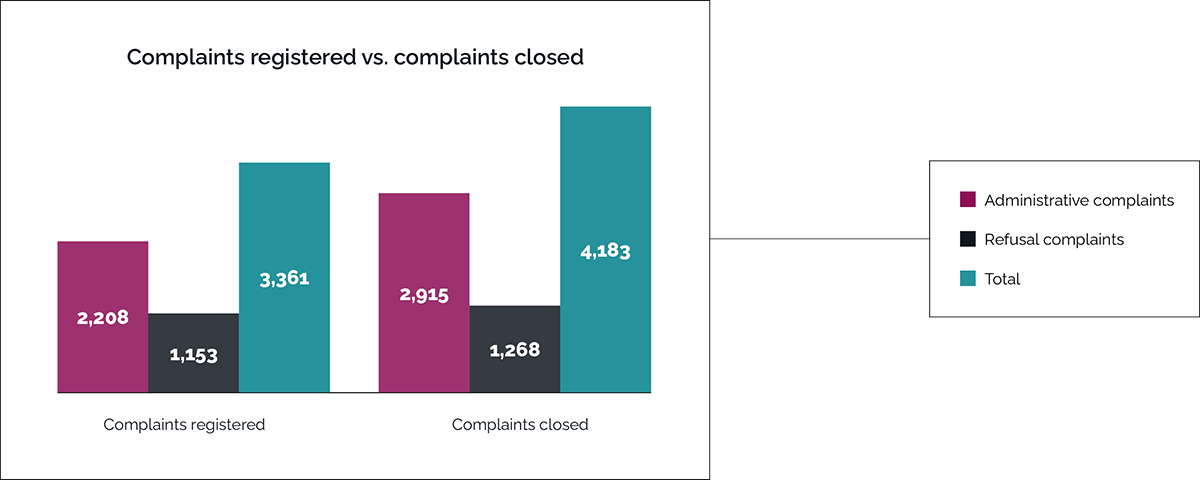
Text version
Complaints registered vs. complaints closed
| Complaints registered | Complaints closed | |
|---|---|---|
| Administrative complaints | 2,208 | 2,915 |
| Refusal complaints | 1,153 | 1,268 |
| Total | 3,361 | 4,183 |
Addressing the inventory of complaints
Another area of focus for the Commissioner since the beginning of her mandate has been addressing the inventory of complaints she inherited while investigating new complaints as they come in.
In 2023–2024, the OIC continued to make significant progress on the most challenging complaints in the inventory. Some of these contain thousands of pages with many exemptions claimed, while many involve third-party information or the analysis of highly technical and sensitive information.
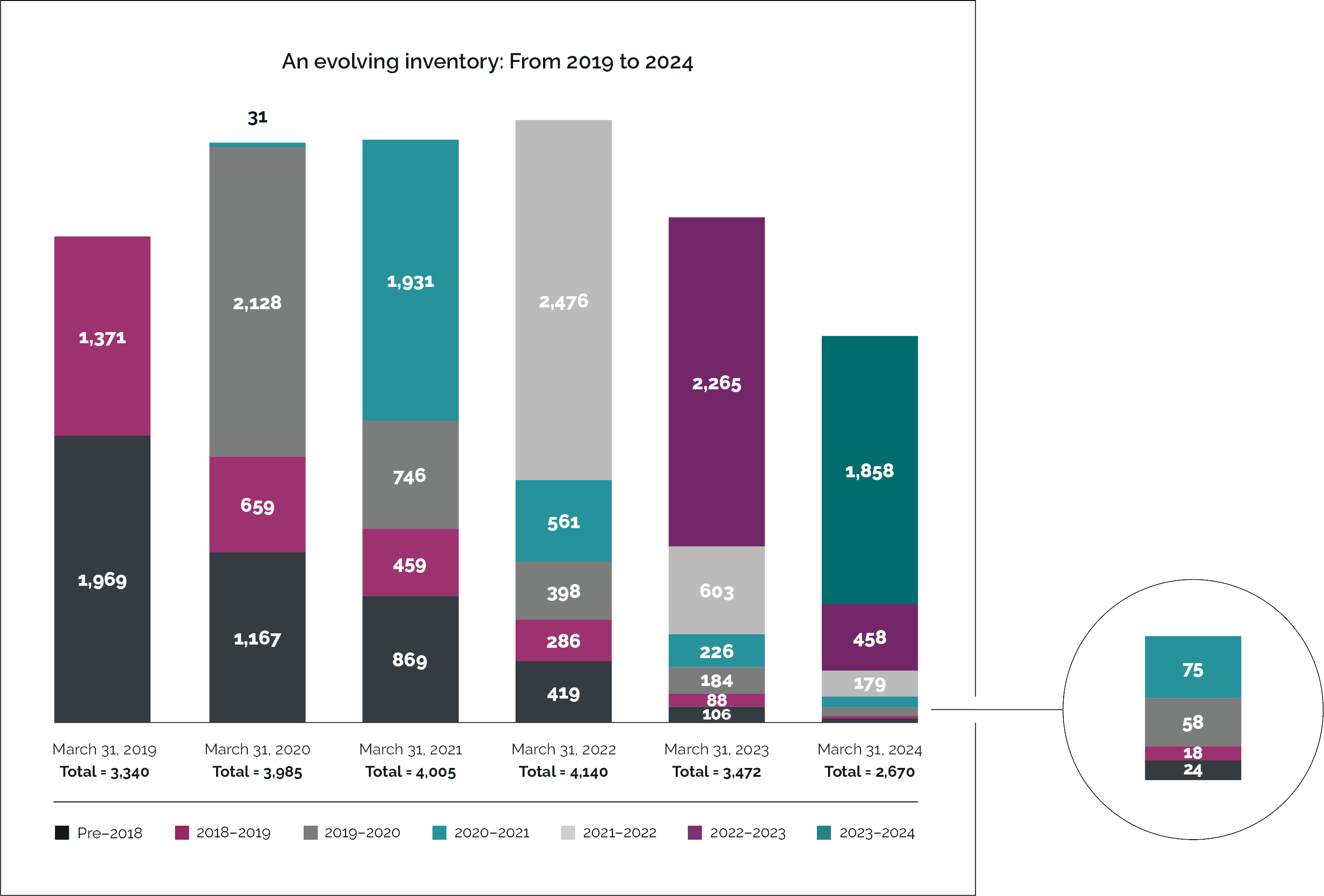
Text version
An evolving inventory: From 2019 to 2024
| March 31, 2019 | March 31, 2020 | March 31, 2021 | March 31, 2022 | March 31, 2023 | March 31, 2024 | |
|---|---|---|---|---|---|---|
| Pre-2018 | 1,969 | 1,167 | 869 | 419 | 106 | 24 |
| 2018–2019 | 1,371 | 659 | 459 | 286 | 88 | 18 |
| 2019–2020 | 2,128 | 746 | 398 | 184 | 58 | |
| 2020–2021 | 31 | 1,931 | 561 | 226 | 75 | |
| 2021–2022 | 2,476 | 603 | 179 | |||
| 2022–2023 | 2,265 | 458 | ||||
| 2023–2024 | 1,858 | |||||
| Total | 3,340 | 3,985 | 4,005 | 4,140 | 3,472 | 2,670 |
Lack of predictability in number of complaints submitted
The number of complaints submitted to the OIC fluctuates from year to year. While various factors may influence this volume, including the resources allocated to institutions’ access to information and privacy (ATIP) units, the OIC has no control over the volume of complaints received.
For instance, following two record-breaking years, the OIC saw a decrease in the number of complaints registered in 2023–2024. Between 2019–2020 and 2022–2023, Immigration, Refugees and Citizenship Canada (IRCC) accounted for more than 50% of the complaints registered by the OIC each year. In 2023–2024, the complaints against IRCC dropped significantly, representing only 18% of all complaints. In contrast, complaints against the Canada Border Service Agency (CBSA) increased significantly. In fact, CBSA now tops the list of institutions against which the OIC has registered complaints.
During 2023–2024, the Information Commissioner conducted her second systemic investigation into immigration-related access requests. This investigation led to a special report to Parliament entitled Access at issue: The unsustainable status quo. The Commissioner found that, notwithstanding the decrease in complaints, requesters were continuing to use the access system to obtain information related to their immigration applications. This state of affairs stemmed from IRCC’s lack of progress in developing a digital client service solution that would provide a more efficient alternative to the access system, as recommended by the Commissioner in her 2021 special report entitled Access at issue: Challenging the status quo.
The most recent systemic investigation revealed that IRCC has improved its processing of access requests, leading to a reduction in complaints. It also showed that requests for immigration-related information were also being directed to CBSA, which has access to the same data through shared tools.

A decline in the number of complaints against an institution does not necessarily correlate with a decrease in the volume of access requests received by that same institution.
Complaint Activity in 2023–2024
Complaints as of April 1, 2023
Complaints registered
Investigations completed
Orders submitted
Outcomes
Well founded
Not well founded
Discontinued
Cease to investigate
Refuse to investigate
| Complaints as of April 1, 2023 | Complaints registered in 2023-2024 | Investigations completed in 2023-2024 | Well founded | Not well founded | Discontinued | Cease to investigate | Refuse to investigate | Orders | Total | |
|---|---|---|---|---|---|---|---|---|---|---|
| Canada Border Services Agency | 423 | 762 | 655 | 34 | 14 | 187 | 419 | 1 | 3 | 655 |
| Immigration, Refugees and Citizenship Canada | 940 | 614 | 1,392 | 27 | 44 | 108 | 1,208 | 5 | 2 | 1,392 |
| Global Affairs Canada | 91 | 257 | 112 | 33 | 11 | 9 | 58 | 1 | 10 | 112 |
| Privy Council Office | 206 | 218 | 169 | 47 | 26 | 16 | 80 | 0 | 25 | 169 |
| Royal Canadian Mounted Police | 274 | 217 | 289 | 32 | 37 | 45 | 173 | 2 | 5 | 289 |
| National Defence | 106 | 119 | 130 | 45 | 13 | 12 | 59 | 1 | 32 | 130 |
| Canada Revenue Agency | 196 | 105 | 167 | 62 | 34 | 32 | 38 | 1 | 18 | 167 |
| Library and Archives Canada | 235 | 101 | 194 | 109 | 9 | 20 | 55 | 1 | 104 | 194 |
| Health Canada | 69 | 86 | 99 | 28 | 10 | 13 | 47 | 1 | 16 | 99 |
| Public Services and Procurement Canada | 109 | 68 | 66 | 13 | 4 | 13 | 36 | 0 | 7 | 66 |
| Transport Canada | 82 | 65 | 90 | 39 | 14 | 9 | 27 | 1 | 17 | 90 |
| Canadian Security Intelligence Service | 25 | 55 | 45 | 5 | 6 | 11 | 23 | 0 | 0 | 45 |
| Employment and Social Development Canada | 48 | 46 | 46 | 20 | 5 | 3 | 18 | 0 | 11 | 46 |
| Indigenous Services Canada | 39 | 45 | 37 | 6 | 5 | 4 | 22 | 0 | 2 | 37 |
| Canadian Heritage | 20 | 44 | 32 | 9 | 6 | 2 | 15 | 0 | 2 | 32 |
| Environment and Climate Change Canada | 19 | 40 | 41 | 12 | 4 | 1 | 24 | 0 | 6 | 41 |
| Public Safety Canada | 21 | 35 | 27 | 4 | 6 | 5 | 12 | 0 | 3 | 27 |
| Department of Finance Canada | 24 | 34 | 35 | 3 | 9 | 3 | 20 | 0 | 0 | 35 |
| Department of Justice Canada | 67 | 32 | 58 | 12 | 16 | 10 | 20 | 0 | 3 | 58 |
| Innovation, Science and Economic Development Canada | 42 | 31 | 43 | 11 | 5 | 6 | 21 | 0 | 6 | 43 |
| Correctional Service Canada | 54 | 30 | 56 | 18 | 7 | 4 | 26 | 1 | 4 | 56 |
| Public Health Agency of Canada | 18 | 29 | 28 | 9 | 4 | 4 | 11 | 0 | 7 | 28 |
| Fisheries and Oceans Canada | 24 | 27 | 37 | 14 | 8 | 1 | 14 | 0 | 5 | 37 |
| Canadian Broadcasting Corporation | 10 | 21 | 15 | 4 | 8 | 2 | 1 | 0 | 0 | 15 |
| Natural Ressources Canada | 16 | 19 | 19 | 6 | 7 | 1 | 5 | 0 | 0 | 19 |
| Subtotal | 3,158 | 3,100 | 3,882 | 602 | 312 | 521 | 2,432 | 15 | 288 | 3,882 |
| Other Institutions | 322 | 261 | 301 | 80 | 61 | 65 | 95 | 0 | 22 | 301 |
| Total | 3,480 | 3,361 | 4,183 | 682 | 373 | 586 | 2,527 | 15 | 310 | 4,183 |
Text version
Complaint Activity in 2023–2024
| Active complaints in 2023-2024 | Investigations completed in 2023-2024 | Outcomes | Orders | ||||||||||
|---|---|---|---|---|---|---|---|---|---|---|---|---|---|
| Active complaints as of April 1, 2023 | Complaints registered between April 1, 2023 and March 31, 2024 | Total | Complaints registered before April 1, 2023 | Complaints registered between April 1, 2023 and March 31, 2024 | Total | Well founded | Not well founded | Discontinued | Cease to investigate | Refuse to investigate | Total | Orders submitted | |
| Canada Border Services Agency | 423 | 762 | 1,185 | 299 | 356 | 655 | 34 | 14 | 187 | 419 | 1 | 655 | 3 |
| Immigration, Refugees and Citizenship Canada | 940 | 614 | 1554 | 919 | 473 | 1,392 | 27 | 44 | 108 | 1,208 | 5 | 1,392 | 2 |
| Global Affairs Canada | 91 | 257 | 348 | 81 | 31 | 112 | 33 | 11 | 9 | 58 | 1 | 112 | 10 |
| Privy Council Office | 206 | 218 | 424 | 114 | 55 | 169 | 47 | 26 | 16 | 80 | 0 | 169 | 25 |
| Royal Canadian Mounted Police | 274 | 217 | 491 | 185 | 104 | 289 | 32 | 37 | 45 | 173 | 2 | 289 | 5 |
| National Defence | 106 | 119 | 224 | 88 | 42 | 130 | 45 | 13 | 12 | 59 | 1 | 130 | 32 |
| Canada Revenue Agency | 196 | 105 | 300 | 128 | 39 | 167 | 62 | 34 | 32 | 38 | 1 | 167 | 18 |
| Library and Archives Canada | 235 | 101 | 336 | 165 | 29 | 194 | 109 | 9 | 20 | 55 | 1 | 194 | 104 |
| Health Canada | 69 | 86 | 155 | 59 | 40 | 99 | 28 | 10 | 13 | 47 | 1 | 99 | 16 |
| Public Services and Procurement Canada | 109 | 68 | 177 | 46 | 20 | 66 | 13 | 4 | 13 | 36 | 0 | 66 | 7 |
| Transport Canada | 82 | 65 | 147 | 60 | 30 | 90 | 39 | 14 | 9 | 27 | 1 | 90 | 17 |
| Canadian Security Intelligence Service | 25 | 55 | 80 | 16 | 30 | 45 | 5 | 6 | 11 | 23 | 0 | 45 | 0 |
| Employment and Social Development Canada | 48 | 46 | 94 | 37 | 9 | 46 | 20 | 5 | 3 | 18 | 0 | 46 | 11 |
| Indigenous Services Canada | 39 | 45 | 84 | 20 | 17 | 37 | 6 | 5 | 4 | 22 | 0 | 37 | 2 |
| Canadian Heritage | 20 | 44 | 64 | 19 | 13 | 32 | 9 | 6 | 2 | 15 | 0 | 32 | 2 |
| Environment and Climate Change Canada | 19 | 40 | 59 | 16 | 25 | 41 | 12 | 4 | 1 | 24 | 0 | 41 | 6 |
| Public Safety Canada | 21 | 35 | 56 | 15 | 12 | 27 | 4 | 6 | 5 | 12 | 0 | 27 | 3 |
| Department of Finance Canada | 24 | 34 | 58 | 20 | 15 | 35 | 3 | 9 | 3 | 20 | 0 | 35 | 0 |
| Department of Justice Canada | 67 | 32 | 99 | 47 | 11 | 58 | 12 | 16 | 10 | 20 | 0 | 58 | 3 |
| Innovation, Science and Economic Development Canada | 42 | 31 | 73 | 26 | 17 | 43 | 11 | 5 | 6 | 21 | 0 | 43 | 6 |
| Correctional Service Canada | 54 | 30 | 84 | 42 | 14 | 56 | 18 | 7 | 4 | 26 | 1 | 56 | 4 |
| Public Health Agency of Canada | 18 | 29 | 47 | 16 | 12 | 28 | 9 | 4 | 4 | 11 | 0 | 28 | 7 |
| Fisheries and Oceans Canada | 24 | 27 | 51 | 22 | 15 | 37 | 14 | 8 | 1 | 14 | 0 | 37 | 5 |
| Canadian Broadcasting Corporation | 10 | 21 | 31 | 7 | 8 | 15 | 4 | 8 | 2 | 1 | 0 | 15 | 0 |
| Natural Ressources Canada | 16 | 19 | 35 | 13 | 6 | 19 | 6 | 7 | 1 | 5 | 0 | 19 | 0 |
| Subtotal | 3,158 | 3,100 | 6,256 | 2,460 | 1,422 | 3,882 | 602 | 312 | 521 | 2,432 | 15 | 3,882 | 288 |
| Other Institutions | 322 | 261 | 583 | 208 | 93 | 301 | 80 | 61 | 65 | 95 | 0 | 301 | 22 |
| Total | 3,480 | 3,361 | 6,839 | 2,668 | 1,515 | 4,183 | 682 | 373 | 586 | 2,527 | 15 | 4,183 | 310 |
Operational enhancements in 2023–2024
In 2023–2024, the OIC continued to improve its processes and tools:
Revamped complaint form
In July 2023, the OIC introduced a significant update to its online complaint form. While retaining all of the user-friendly elements of its predecessor, the new form provides additional features to help complainants accurately submit their complaints. It enables complainants to provide more information at the outset, which allows the OIC’s Registry to make more efficient decisions regarding complaint admissibility. To complement the updated online form, the OIC enhanced the accessibility of the PDF version.
Updated website content
To help complainants, institutions and others better understand the complaint submission and investigation processes, the OIC published new or updated web pages related to complaints and investigations, including an expanded Frequently Asked Questions section. Explanations of key points complainants should consider and steps they should take before submitting their complaint were also added to the OIC website.
In 2023–2024, the OIC also continued to develop guidance on the Commissioner’s interpretation of various sections of the Act. This is part of ongoing efforts to provide as much information and clear explanation as possible to institutions and complainants, so they have a better understanding of how the OIC investigates complaints. One notable example is the publication of Exemption from disclosure: advice, accounts, positions and plans. Focussing on section 21, which covers the inner decision-making processes of government, this guidance sheds light on the requirements of this exemption and the elements investigators examine when determining whether institutions applied it properly.
Following an independent evaluation of its investigations program conducted in 2022–2023, the OIC developed a Management Action Plan to improve communications with institutions.
This year, the OIC sought input from complainants through an independent third party to better understand their needs and with a view to adopting additional measures to bridge any identified gaps.
In the Registry
The Registry is the first stop for all new complaints. There, staff determine whether complaints are admissible. They then notify complainants and institutions that admissible complaints will be investigated and gather the information and documents investigators need to begin their work.
Focus on admissibility
The criteria Registry staff use to determine whether complaints are admissible include whether the OIC has enough information to investigate them, whether they were submitted by the 60-day deadline and whether they fall within the Commissioner’s mandate. In 2023–2024, Registry staff determined that nearly 1,500 complaints were inadmissible for these and other reasons. In 2023–2024, the OIC published guidance on the timeframe for submitting complaints. The 60-day deadline is firm, and the Commissioner has no power to extend it.
More effective communications with complainants and institutions
The OIC improved its Notice of Intention to Investigate. The Commissioner issues this document to advise the institution and the complainant that she will investigate an admissible complaint. It includes a clear statement of the complainant’s allegations and informs both the complainant and institution which matters will be investigated. As such, it enables the complainant to promptly clarify allegations, as needed.
With the OIC’s updated Initial Request for Information and Documents, institutions now also receive clearer and more detailed instructions from the Registry about submitting what is needed to start investigations. This has resulted in institutions providing the relevant material more quickly, and in a more manageable format.
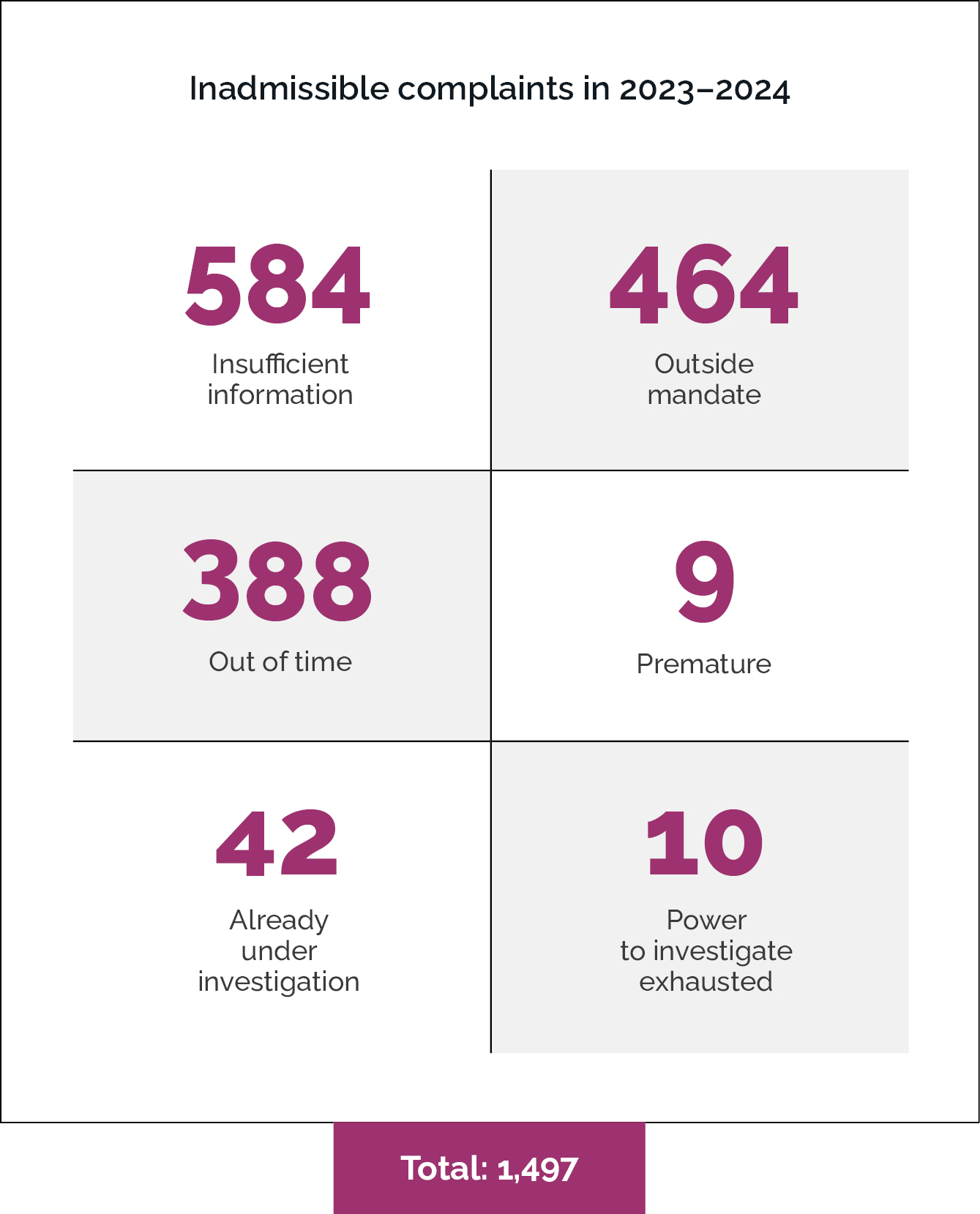
Text version
Inadmissible complaints in 2023–2024
| Insufficient information | Outside mandate | Out of time | Premature | Already under investigation | Power to investigate exhausted |
|---|---|---|---|---|---|
| 584 | 464 | 388 | 9 | 42 | 10 |
What happens when you submit a complaint?
The OIC receives complaints on a variety of topics against nearly 100 institutions each year. Regardless of the specifics, each complaint follows the same basic steps:
- Initial processing: The Registry reviews each complaint to determine whether it is admissible.
- Information gathering: If the complaint is admissible, the Registry collects the documents and information investigators need to get started. Once the complaint is assigned, the investigator gathers input on the allegations from the complainant, institution and other parties.
- Analysis: The investigator analyzes all the facts and input and may follow up with the complainant, institution and other parties to gather more information. The investigator may also work with the complainant and institution to resolve or narrow the allegations under investigation.
Possible outcomes: Based on the investigator’s analysis, the Commissioner may decide that the complaint is well founded or not well founded, depending on whether the allegations have merit. Sometimes, complainants withdraw complaints or the Commissioner decides to refuse or cease to investigate them (for example, when an institution responds to an access request that is the subject of a delay complaint).
For well-founded complaints, the Commissioner may order institutions to take specific actions to resolve the matters at issue.
- Reporting: At the conclusion of each investigation, the Commissioner reports to the complainant, institution and other parties, as applicable:
- When a complaint is well founded and the Commissioner intends to make orders, she sends an initial report to the institution outlining her analysis, findings and the orders she intends to make.
- She then sends a final report to the complainant and institution (and other parties, as needed), similarly outlining her analysis, findings and orders and, importantly, indicating whether the institution has agreed to implement them.
- The Commissioner also sends final reports to complainants and institutions when complaints are not well founded.
The OIC publishes many of its final reports in its Decisions Database, as well as information on all of the Commissioner’s orders.
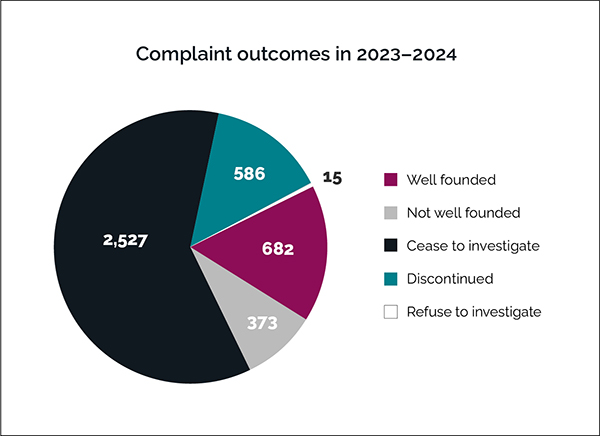
Text version
Complaints outcomes in 2023–2024
| Outcomes | 2023–2024 |
|---|---|
| Well founded | 682 |
| Not well founded | 373 |
| Cease to investigate | 2,527 |
| Discontinued | 586 |
| Refuse to investigate | 15 |
| Outcomes | 2022–2023 | 2023–2024 | ||
|---|---|---|---|---|
| Well founded | 1,018 | 12% | 682 | 16% |
| Not well founded | 474 | 6% | 373 | 9% |
| Cease to investigate | 5,957 | 74% | 2,527 | 60% |
| Discontinued | 610 | 7.6% | 586 | 14% |
| Refuse to investigate | 30 | 0.40% | 15 | 1% |
| Total | 8,089 | 100% | 4,183 | 100% |
The OIC works with complainants, institutions and other parties from the time a complaint is submitted to the conclusion of the investigation. This involves requesting representations from the parties and working closely with them to find solutions and ways to resolve the matters under investigation as quickly as possible.

Orders: One possible outcome for complaints
Since the 2019 amendments to the Act, the Information Commissioner may make any order that she considers appropriate to resolve the matters at issue in well-founded complaints.
In 2023–2024, the Commissioner issued 310 orders, including 275 stemming from investigations into complaints involving delay and extension of time allegations (administrative complaints) and 35 following investigations into, for example, whether institutions correctly applied exemptions or conducted a reasonable search for records (refusal complaints).
The Commissioner’s orders are legally binding. This means that institutions are obliged to implement them unless they apply to the Federal Court for a review. During 2023–2024, three institutions went to court for such a review. Their 16 cases focused on orders issued at the conclusion of investigations into administrative complaint cases.
In these cases, the Commissioner had found that institutions had failed to meet their obligation to respond to the access request within the time limits set out in the Act. She therefore issued orders requiring the institutions to respond to the access requests.
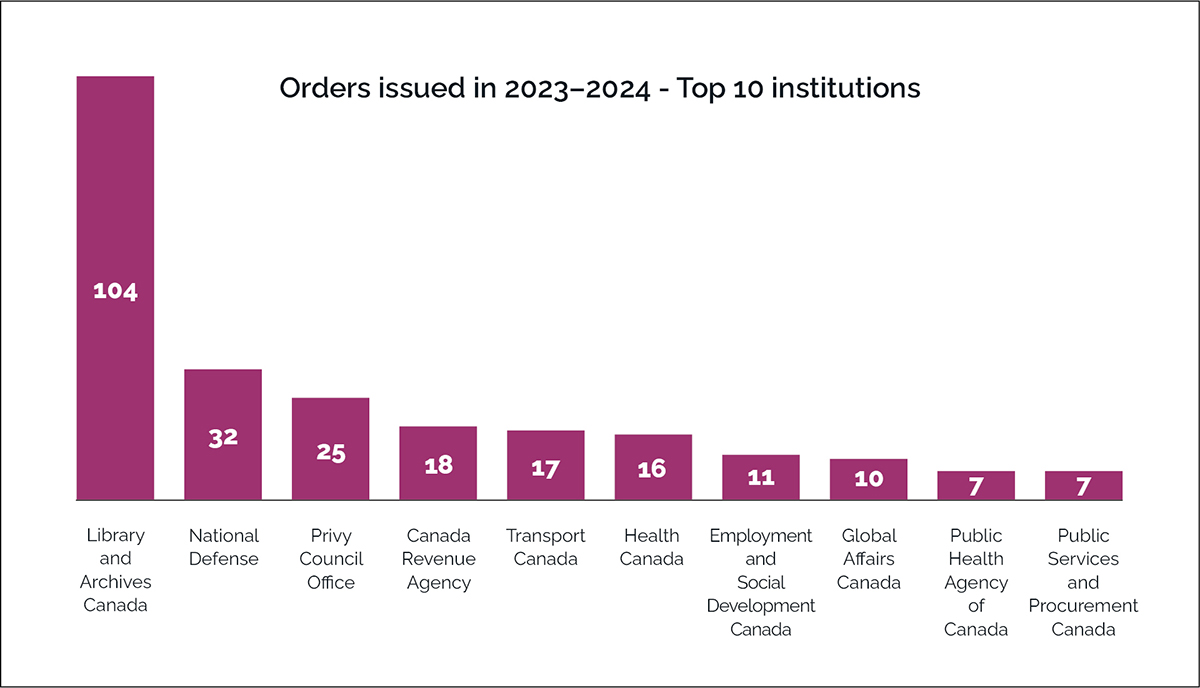
Text version
Orders issued in 2023–2024 - Top 10 institutions
| Institution | Orders issued |
|---|---|
| Library and Archives Canada | 104 |
| National Defence | 32 |
| Privy Council Office | 25 |
| Canada Revenue Agency | 18 |
| Transport Canada | 17 |
| Health Canada | 16 |
| Employment and Social Development Canada | 11 |
| Global Affairs Canada | 10 |
| Public Health Agency of Canada | 7 |
| Public Services and Procurement Canada | 7 |
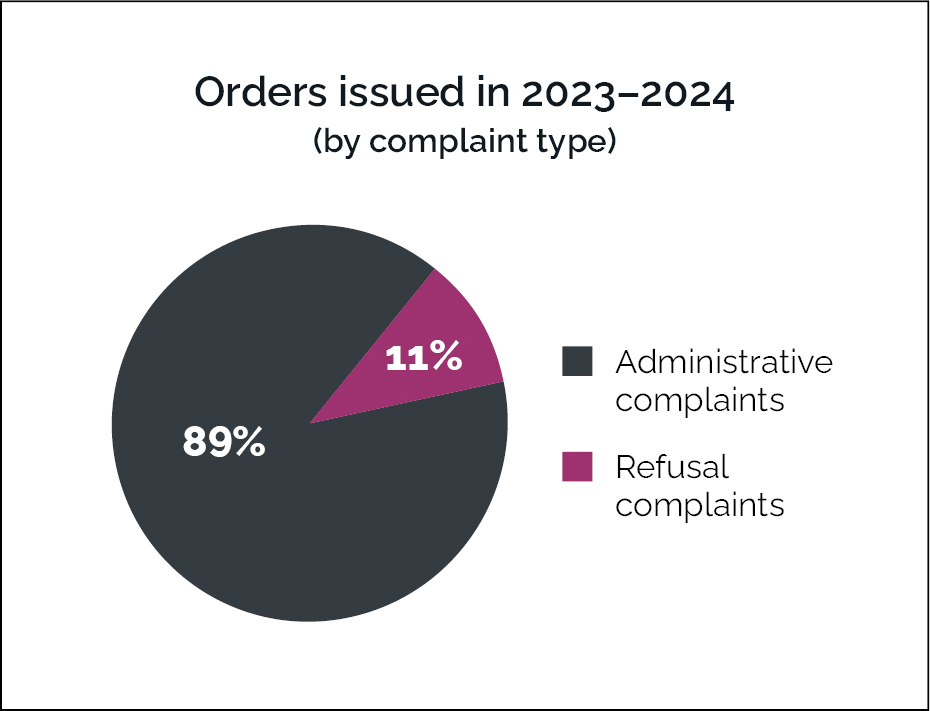
Text version
Orders issued in 2023–2024 (by complaint type)
| Complaint type | Orders issued | Percentage |
|---|---|---|
| Administrative complaints | 275 | 89% |
| Refusal complaints | 35 | 11% |
| Total | 310 | 100% |
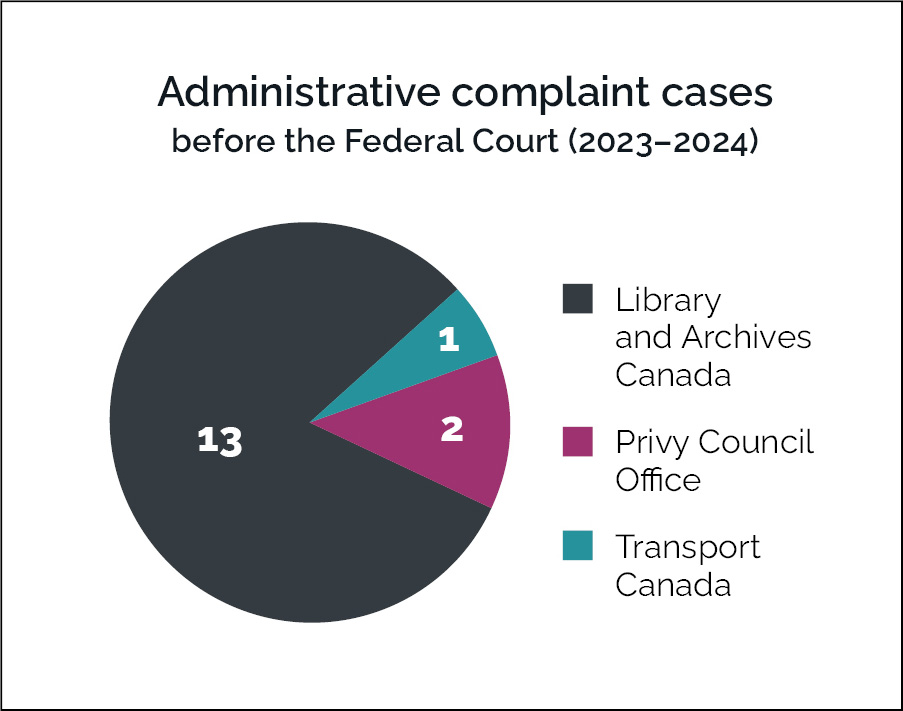
Text version
Administrative complaint cases before the Federal Court (2023–2024)
| Institution | Administrative complaint cases |
|---|---|
| Library and Archives Canada | 13 |
| Privy Council Office | 2 |
| Transport Canada | 1 |
Three institutions challenge orders on refusal complaints:
Export Development Canada
The Export Development Canada (EDC) asked the Federal Court to set aside the Commissioner’s order that EDC disclose the policy numbers and maximum liability amounts associated with its insurance policies worth $50,000 (or more) in Honduras between 2009 and 2019. At issue was whether EDC was justified in refusing to disclose this information based on section 24.3 of the Export Development Act, which is incorporated by reference into section 24, and/or section 18.1 of the Access to Information Act. The Court dismissed EDC’s application, ordering the information to be disclosed.
The Court concluded that EDC’s interpretation of section 24.3 was overly broad and was not supported by the wording of the Act, would render the words “obtained by” meaningless and could not be what Parliament intended when it drafted the provision. The Court agreed with the Information Commissioner’s interpretation of section 24.3, concluding as follows:
- The Act distinguishes between information “obtained by” and information “created by” a government institution.
- In order for it to have been “obtained” by EDC,
- the information must have existed before EDC received it
- the source of the information must be external to EDC (i.e., coming directly from its customers or supplied to EDC by third parties in relation to its customers).
- The information that EDC created (either exclusively or jointly with another party) cannot also have been obtained by or supplied to EDC.
The Court concluded that because EDC created the redacted information it was not protected by section 24.3 of the Export Development Act and, in turn, section 24 of the Access to Information Act.
The Court also rejected EDC’s arguments that the information could be withheld under section 18.1 of the Access to Information Act, which is intended to protect the economic interests of government institutions listed in the exemption, including EDC. It also established a test for determining the applicability of section 18.1, stating that the following four elements must be established in order for information to be withheld under this exemption:
- The information is trade secrets or financial, commercial, scientific or technical information as those terms are commonly understood.
- There is a reasonable nexus between the information requested and the Corporation’s economic interests.
- The information belongs to one of the corporations listed in subsection 18.1(1).
- The information has been treated consistently in a confidential manner.
The Court concluded that EDC failed to meet the second and fourth elements of this test. EDC has appealed this decision to the Federal Court of Appeal.
Public Services and Procurement Canada
The complainant alleged that Public Services and Procurement Canada (PSPC) failed to conduct a reasonable search for records in response to an access request for the Health Protection Building (Tunney’s Pasture) Whole Building Designated Substances Report.
The Commissioner concluded that the complaint was well founded and that the documents were under PSPC's control, and thus subject to the Act. She then ordered PSPC to retrieve the records and to respond to the access request by processing the records at issue in accordance with the Act. PSPC is challenging the order in Federal Court. The case has recently been heard, with the decision expected later this year.
Agriculture and Agri-Food Canada
The complainant alleged that Agriculture and Agri-Food Canada (AAFC) had improperly withheld information under subsection 19(1) (personal information) and paragraph 20(1)(b) (confidential third-party financial, commercial, scientific or technical information) of the Act in response to an access request. The request was for communication with the National Farm Animal Care Council regarding the Five-Year Review Summary Report and proposed amendments to the Code of Practice for the Care and Handling of Pigs.
The Commissioner concluded that the complaint was well founded. She then ordered AAFC to disclose all information withheld under paragraph 20(1)(b), unless it qualifies for exemption pursuant subsection 19(1) or is outside the scope of the access request. AAFC is challenging the order in Federal Court. The case will be heard in late 2024 or early 2025.
In another refusal complaint, the Commissioner filed an application for review with the Federal Court:
Crown-Indigenous Relations and Northern Affairs Canada
In response to an access request for records related to the ownership, sale, reversion or return of lands on or around Bruce/Saugeen Peninsula, dating from the 1850s to 1980, Crown-Indigenous Relations and Northern Affairs Canada withheld information under section 23 (solicitor-client and litigation privilege) of the Act.
The Commissioner recommended to the Minister to disclose all of the records. The recommendation was not implemented. The Commissioner applied to the Federal Court on behalf of the complainant.

Applications for mandamus
In 2022–2023, the Commissioner raised concerns about institutions that had neither implemented her orders nor sought review before the Federal Court, as the Act requires. By ignoring her orders, these institutions are breaking the law. In concrete terms, this means Canadians face additional delays in receiving the information they have requested and are entitled to.
In the face of this intransigence, the Commissioner began launching legal proceedings against institutions that had decided to ignore her orders. In 2023–2024, she initiated four applications for an order of mandamus before the Court to compel compliance with her orders.
A writ of mandamus is an extraordinary remedy asking a court to order a public authority to perform a legal duty.
Since the Commissioner’s orders are legally binding, a writ of mandamus should not be necessary. This expends the OIC’s resources and those of institutions that are deploying their own legal resources to respond to these applications.
Nevertheless, the Commissioner has indicated that she will continue to take similar action in the future, when required.
Trans Mountain Corporation
In July 2023, in the face of Trans Mountain Corporation (TMC)’s refusal to abide by her order or apply to the Federal Court for a review, the Information Commissioner filed her first application for a writ of mandamus with the Federal Court against the head of an institution.
The application noted that the Commissioner held “a genuine interest in bringing the matter before the court to ensure that government institutions adhere to her orders,” since it “is in the public interest to compel government institutions to uphold their statutory duties under the Act by adhering to the Commissioner’s orders.”
TMC acknowledged it had violated its legal duty by failing to implement the Commissioner’s order and agreed to have the Court issue an order of mandamus. The order of mandamus on consent was issued by the Court on September 19, 2023. TMC finally responded to the requester in January 2024.
Department of National Defence
In June 2023, the Information Commissioner ordered the Minister of National Defence to release by November 30, 2023, records on the Department of National Defence’s COVID-19 policies. These policies had been requested through an access request the year before.
The Department told the OIC it would comply with the order. However, it did not meet the deadline to do so. In December 2023, the Commissioner filed an application for a writ of mandamus to compel the Minister of National Defence to comply with her order.
In February 2024, the Commissioner filed two applications for mandamus to compel the Minister to comply with other orders that should have been implemented in November and December 2023.
Observations on the access to information system
Through its investigations and engagement with stakeholders, the OIC has a unique perspective on the challenges facing the federal access to information system. In 2023–2024, several issues caught the Commissioner’s attention.
Access to information is a collective responsibility
In order for institutions’ ATIP units to process records in response to an access request, collaboration with program officials who hold the records is crucial. A lack of responsiveness from record-holders greatly affects an institution’s ability to respond to requests in accordance with the requirements of the Act. The OIC has become aware of an increasing number of institutions in which ATIP units face this challenge.
Heads of institutions must remind their employees of their responsibilities for providing Canadians with timely access to information. The Commissioner engaged with the senior management teams of several institutions this year to underscore this critical responsibility.
Institutions also need to develop appropriate processes and procedures to ensure that program officials promptly provide responsive records to their ATIP unit. The ATIP unit is responsible for reviewing documents and determining whether information should be disclosed. Even if the officials are of view disclosure is unnecessary, or the requested documents are classified as Secret, they must still forward them to the ATIP unit.
In addition, institutions should implement performance indicators to hold their senior officials accountable for delays in providing responsive records to ATIP requests.

The ATIP unit is not solely responsible for ensuring the Act is respected; rather, this is a collective responsibility shared by all public servants. It is up to the head of the institution to ensure that this is understood and respected.
Sending the right message on access to information
The Commissioner received a complaint alleging that chief financial officers (CFOs) from institutions across the federal government had, during a meeting on February 2, 2023, received direction from the Office of the Comptroller General of Canada (OCG) not to record information of business value because it would be accessible under the Access to Information Act. Specifically, the complainant alleged that the Comptroller General advised those in attendance to, “Be careful what you write down. It will find its way out through an ATIP.”
The OCG maintained that the statements were intended simply to remind public servants to remain factual in their communications to avoid situations in which personal opinions could be understood to be the Government of Canada’s position. The OCG also indicated that no one from its organization ever said or implied that CFOs should not record information of business value.
In the complainant’s view, the statements contradicted both the purpose and spirit of the Act by restricting access to written opinions and views from public servants.
The OIC asked CFOs who had attended the meeting for their understanding of the statements. The consensus was that the statements were perceived as a reminder that, when dealing with sensitive situations, government employees need to remain factual in their documentation.
Ultimately, the complaint was discontinued. However, it is interesting to note that, in a recent communication to CFOs, the Comptroller General emphasized the importance of maintaining a culture of accountability and transparency across government. He reminded colleagues that decisions must be, “supported by accurate and complete information” and that “records must be maintained to facilitate access to information whether it be proactive or in response to requests.”

There is no obligation in the Act for institutions to record information of business value. The Information Commissioner has recommended a comprehensive and codified duty to document that would include oversight and enforcement.
Challenges low-volume institutions face
Roughly 110 institutions that are subject to the Access to Information Act receive 10 or fewer access requests per year. Among these organizations are most ports, pilotage authorities and museums.
Through its investigations, the OIC has noted that these institutions frequently lack knowledge of how to handle access requests and of their obligations under the Act. They typically do not have a dedicated team that coordinates access requests, and the individuals assigned to this task often find themselves managing multiple responsibilities. Occasionally, low-volume institutions receive a sudden in flux of requests, leading to challenges managing their workload.
Working with institutions unfamiliar with their access obligations presents several challenges for the OIC, including the following:
- Institutions create new records to summarize documents, rather than providing the actual documents, which constitutes a denial of access.
- They improperly apply exemptions or have a poor understanding of their obligations to requesters.
- They do not recognize access to information as a priority or even a responsibility.
- They have insufficient resources to provide representations and evidence to the OIC in a timely manner.

The Commissioner urges low-volume institutions to meet their legal obligations regarding access to information. In doing so, they can avoid legal actions and, ultimately, better serve Canadians.
Shining light on request backlogs
Each institution subject to the Act is required to provide the Treasury Board of Canada Secretariat (TBS) with annual statistics on its performance in responding to access requests. One mandatory data point is the number of access requests it carries forward from one year to the next.
Based on information TBS published in December 2023, many institutions are not keeping pace with the rate of new access requests. The tables below show how large institutions’ backlogs are and how they have grown from year to year.
The Commissioner is concerned about the current state of backlogs and emphasizes the critical need for institutions to prioritize efforts to reduce or, ideally, eliminate them. Timely responses to access requests are of paramount importance, and addressing backlogs is essential to maintaining transparency and accountability. To ensure prompt and effective responses to all access requests, it is imperative that institutions take proactive steps to streamline processes, allocate sufficient resources and implement efficient strategies.
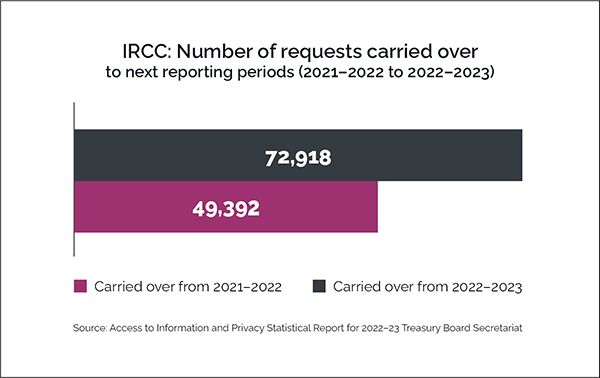
Text version
IRCC: Number of requests carried over to next reporting periods (2021–2022 to 2022–2023)
| Institution | Carried over from 2021–2022 | Carried over from 2022–2023 |
|---|---|---|
| Immigration Refugees and Citizenship Canada | 49,392 | 72,918 |
Source: Access to Information and Privacy Statistical Report for 2022–23 Treasury Board Secretariat
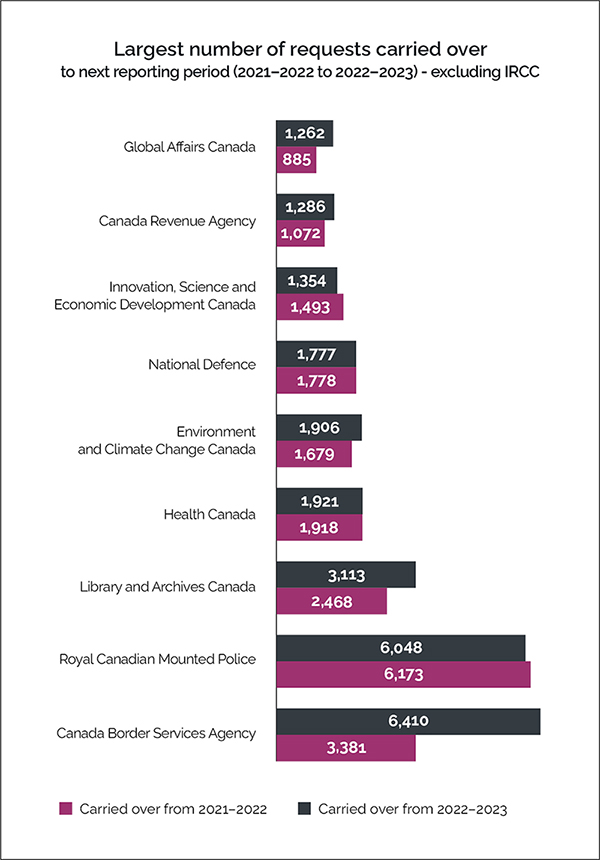
Text version
Largest number of requests carried over to next reporting period (2021–2022 to 2022–2023) - excluding IRCC
| Institution | Carried over from 2021–2022 | Carried over from 2022–2023 |
|---|---|---|
| Global Affairs Canada | 885 | 1,262 |
| Canada Revenue Agency | 1,072 | 1,286 |
| Innovation, Science and Economic Development Canada | 1,493 | 1,354 |
| National Defence | 1,778 | 1,777 |
| Environment and Climate Change Canada | 1,679 | 1,906 |
| Health Canada | 1,918 | 1,921 |
| Library and Archives Canada | 2,468 | 3,113 |
| Royal Canadian Mounted Police | 6,173 | 6,048 |
| Canada Border Services Agency | 3,381 | 6,410 |
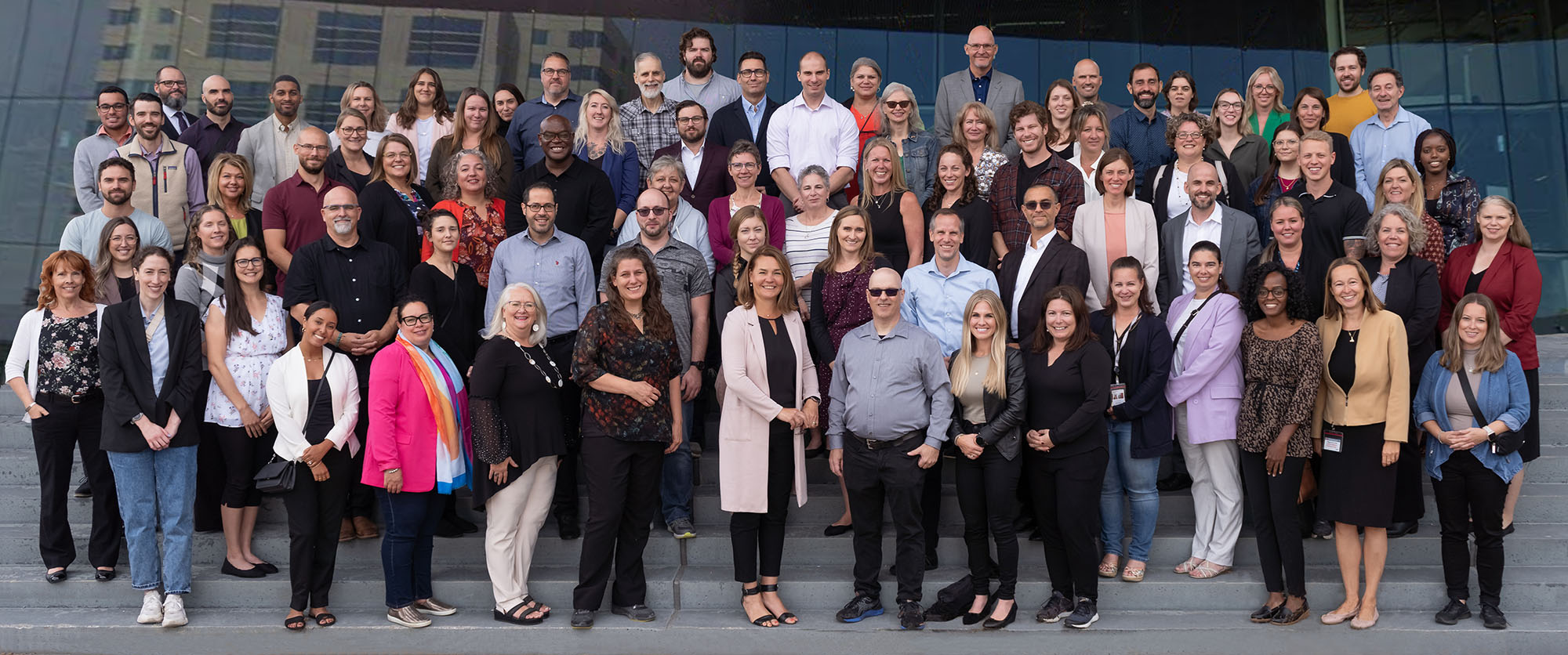
About the Office of the Information Commissioner
The purpose of Canada's Access to Information Act, which came into force in 1983, is to protect the public’s right to access records under the control of government institutions, while ensuring that the use of exemptions and exclusions is limited and specific. The Act also entrusts the Information Commissioner of Canada with the independent review of any matters relating to requesting or obtaining access to records under Part 1 of the Act. The OIC was established to support the Information Commissioner in her capacity role as an independent agent of Parliament.
The OIC seeks to enforce the Act, using the full range of tools, activities and powers at the Commissioner’s disposal. These include negotiating with complainants and institutions, and making recommendations or orders to resolve matters at the conclusion of investigations.
The OIC supports the Commissioner in her advisory role to Parliament and parliamentary committees on all matters pertaining to access to information. It also actively makes the case for greater freedom of information in Canada through targeted initiatives such as Right to Know Week and ongoing dialogue with Canadians, Parliament and government institutions.
The Information Commissioner carries out confidential investigations about government institutions’ handling of access requests, giving both complainants and institutions the opportunity to present their positions.
Thank you to all the OIC employees who were involved in the development of this annual report, which was produced entirely in-house.
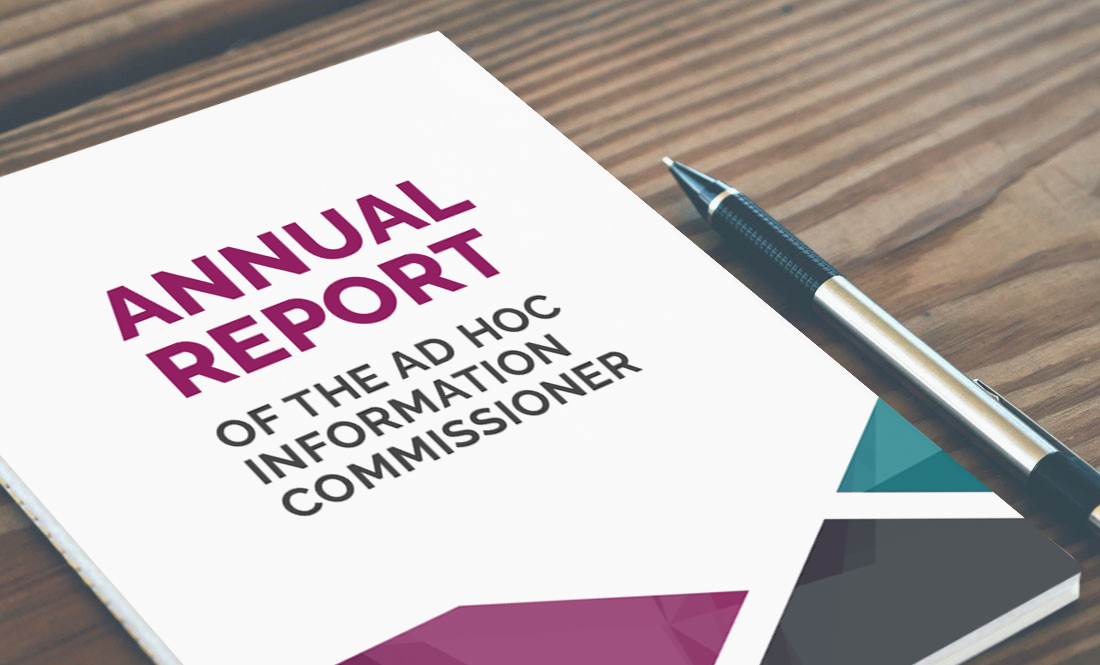
Annex - Annual report of the Ad Hoc Information Commissioner
According to the Access to Information Act, the Office of the Information Commissioner (OIC) is subject to the very legislation it oversees. This means that individuals have the right to request information from the OIC and where they remain dissatisfied with the processing of their requests filed with the OIC, they may complain to the Ad Hoc Information Commissioner.
For those investigations, I review the steps undertaken by the OIC in its handling of the access to information request, including its duty to assist obligation, timeliness, and the completeness of the response issued with a thorough analysis of the facts, representations provided by both parties, and the use of legal exemptions to bar access to requested information. Complaint investigations are concluded with written findings, highlighting the rules governing rights of access to information held by the OIC, and emphasizing those where the OIC refused to grant access to certain types of information. These findings continue to be intended to promote a better understanding of access rights for requested information contained in OIC records.
In the course of my work, I also receive complaints for those who seek answers regarding the status or outcomes of OIC’s complaint investigations involving other federal government institutions. Individuals who have difficulty finding the correct authority with which to file their complaint, be it at a provincial or federal level, also reach out to me. While I cannot accept those complaints, I nonetheless take the time to reply, providing explanations as to my role, and redirecting the individual to the correct institution through website links. Doing so provides a helpful public service in my view.
Fiscal year 2023–2024 was much busier than previous years: 100 new matters were brought to my attention, many of which I could not receive as complaints and were redirected. They also include instances where I was copied in correspondence to several federal government officials that did not require further action on my part.
From April 1, 2023 to March 31, 2024, I handled 103 files and concluded 10 complaint investigations as this breakdown indicates:
- Prior year complaints investigated and concluded: 3
- New complaints received: 10
- Complaints under review: 1
- Complaints investigated and concluded: 7
- Complaints commenced/carried over: 2
- Non-receivable complaints redirected: 66
- No action required type complaints: 24
I look forward to another busy year and to remain of beneficial service to the public.
Respectfully submitted,
Anne E. Bertrand, KC/cr
Ad Hoc Information Commissioner

Text version
Office of the Information Commissioner of Canada
30 Victoria Street
Gatineau, QC K1A 1H3
www.oic-ci.gc.ca
general@oic-ci.gc.ca
Tel: 1-800-267-0441
Fax: 819-994-1768